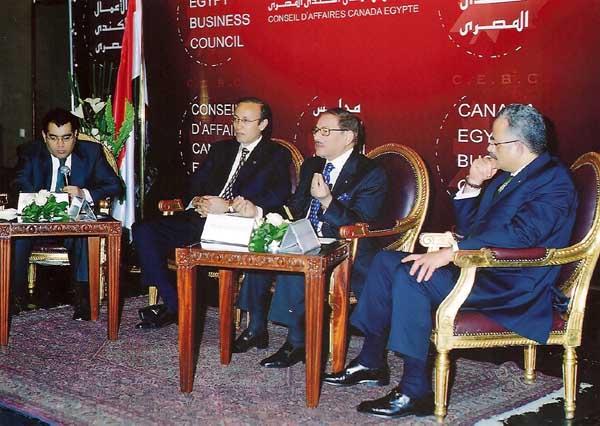
Date
Speaker(s)
Designation
Description
Renowned for his political career and service as a minister, Safwat El Sherif, the outspoken head of the consultative council and the Secretary General of the National Democratic Parties said, “The constitutional amendments made by President Hosni Mubarak are unprecedented and reflect political maturity”.
In an event hosted by CEBC, El Sherif noted that the “N.D.P” has done his homework and studied the constitutional amendments initiative thoroughly long before it was relayed to the public and the People’s Assembly. In an assertive tone, El-Sherif pointed at various political developments in Egypt and said that history will always remember the 2005 initiative, which opened the door for a free and multi-candidate presidential election.
He contended that the move was a key to all reforms, political and economic, ever since. The distinguished guest praised the initiative as a mean of opening the door for serious political participation, exchange of power, and empowering parties to have a bigger role in the Egyptian political arena.
El Sherif stressed that President Mubarak kept his promises during his last presidential campaign, and proposed the constitutional reforms for the sake of a more democratic Egypt. He, the president wanted to empower the parliament, the parties, and the government even if that comes at the expense his own power as the president of republic, El Sherif added. He stressed that the president had a vision to strengthen the power of the two legislative councils.
El-Sherif quoted the President while saying “Egyptians are embarking on a new era of life due to those amendments which have gained legitimacy out of the free will of the Egyptian people and are opening the doors for more work to develop Egypt’s constitutional structure”. El-Sherif said “ when the first articles of the constitution were pondered upon, people who wrote it down were called the ‘council of the naughty’ , or the ‘council of damned’, today we call them the council of wise men”. It is the constitution that gives us the right to dream, to use logic and to find out the realities of our country and the neighboring countries in order to adapt to a world that is always looking for more prosperity, he said.
When asked about the second article of the constitution which is about the Islam being the source of legislation and that there might be contradiction between the article and the principle of citizenship, El Sherif said that the second article of the constitution has not been amended. He added that “when we speak about the amendments, we should agree that they were much needed, and that the president made a promise that the second article is not to be touched”. El Sherif stressed that there is no clash between the principle of citizenship and the second article. He elaborated that citizenship has been well defined and the definition states that there are no racial or ethnic or religious discrimination among the citizens of Egypt.
He also indicated that according to Islam all citizens have the right to choose there religion and that Islam is not a oppressive religion. He pointed to article 40 which stipulates that all Egyptians are equal in front of Egyptian law regardless of religion and color, which neither conflicts with the second article nor the principle of citizenship.
El Sherif said that freedom of faith and the freedom of worship had been guaranteed by the Egyptian constitution. As for empowering women and augmenting their participation in political life, the former tourism and media minister said the constitutional amendments are supporting female representation.
Concerning the heated debate on article 88, which tackles judiciary supervision over the elections, El Sherif said that the amendment was not devised to alienate the judiciary system from the supervision that would guarantee the integrity of the electoral process. In a cynical tone against critics, El Sherif said a party would be “idiotic” and a “failure” if it thought it could come up with a system that would manipulate the results of the elections against the will of the people.
According to El Sherif, the amending this article would put an end to the delays that ballot stations often witnessed and would also preserve the status of judges in the eyes of citizens. He also said that the judiciary will still have supervision over the elections but not inside the ballot stations. He added that discussions over the amendments showed that there is an agreement on 82 % of the amended articles and that the discussions were concerned with their wording not their essence. In a green finish, El Sherif said that no one opposes the necessity of protecting the environment as stipulated by article 179









